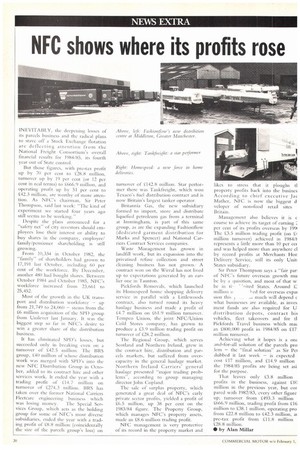NFC shows where its profits rose
Page 20

If you've noticed an error in this article please click here to report it so we can fix it.
INEVITABLY, the deepening losses of its parcels business and the radical plans to stave off a Stock Exchange flotation are deflecting attention from the National Freight Consortium's overall financial results for 1984/85, its fourth year out of State control.
But those figures, with pre-tax profit up by 70 per cent to 08.8 million, turnover up by 19 per cent (or 12 per cent in real terms) to £666.9 million, and operating profit up by 51 per cent to C42.3 million, are worthy of more attention. As NFC's chairman, Sir Peter Thompson, said last week: "The kind of experiment we started four years ago still seems to be working.
Despite the plans announced for a "safety net" of city investors should employees lose their interest or ability to buy shares in the company, employee/ family/pensioner shareholding is still growing.
From 10,334 in October 1982, the "familyof shareholders had grown to 17,191 last October, including 60 per cent of the workforce. By December, another 480 had bought shares. Between October 1984 and October 1985, NFC's workforce increased from 23,661 to 15,452.
Most of the growth in the UK transport and distribution workforce — up from 21,749 to 24,060 — stems from the .C6 million acquisition of the SPD group from Unilever last January. It was the biggest step so far in NFC's desire to win a greater share of the distribution business.
It has eliminated SPD's losses, but succeeded only in breaking even on a turnover of 1:42.5 million. The BRS group, i:40 million of whose distribution work was merged with 511 )'s into the new NEC Distribution Group in October, added to its contract hire and other services work. It ended the year with a trading profit of :14.7 million on turnover of £274.3 million. BRS has taken over the former National Carriers Heetcare engineering business which
was losing money. The Special Services Group, which acts as the holding group for sonic of NFC's most diverse subsidiaries, ended the year with a trading profit of £8.8 million (coincidentally the size of the parcels group's loss) on
turnover of 1:142.8 million. Star performer there was Tankfreight, which won Texaco's fuel distribution contract and is now Britain's largest tanker operator.
Britannia Gas, the new subsidiary formed to import, store and distribute liquefied petroleum gas from a terminal at Immingham, is part of this same group, as are the expanding Fashionflow (dedicated garment distribution for Marks and Spencer) and National Carriers Contract Services companies.
Waste Management has grown in Landfill work, but its expansion into the privatised refuse collection and street cleaning business has not grown.' A contract won on the Wirral has not lived up to expectations generated by an earlier one in Taunton.
Pickfords Removals, which launched its Homespeed home shopping delivery service in parallel with a Littlewoods contract, also turned round its heavy haulage business and made a profit of .4.7 million on C61.9 million turnover. Tempe° Union, the joint NEC/Union Cold Stores company, has grown to produce a 0.9 million trading profit on turnover of £28.2
The Regional Group, which serves Scotland and Northern Ireland, grew in the contract hire, distribution and parcels markets, but suffered from overcapacity in the general haulage market. Northern Ireland Carriers' general haulage presented "major trading problems-, according to group managing director John Copland.
The sale of surplus property, which generated a great deal of NFC's early private sector profits, yielded a profit of 1:6.5 million, up 38 per cent on the 1983/84 figure. The Property Group, which manages WC's property assets, made an £8.6 million trading profit.
NFC management is very protective of its record in the property market and likes to stress that it ploughs tl property profits back into the busines
According to chief executive Jac Mather, NFC is now the biggest d. veloper of non-food retail sites Britain.
Management also believes it is c course to achieve its target of earning per cent of its profits overseas by 1991 The 1:3.5 million trading profit (on S'..4 million turnover) achieved in 1980 represents a little more than 10 per cet and was helped more than anywhere el by record profits at Merchants Hon Delivery Service, still its only Unit. States subsidiary.
Sir Peter Thompson says a "fair par of NEC's future overseas growth mu be by a quisition, and most of that w
be in —nited States. Around million i 1-ed for overseas expai
sion this ) much will depend c what businesses are available, as inves ment funds are also required for U distribution depots, contract hii vehicles, fleet takeovers and for tl Pickfords Travel business which mac an 5:800,000 profit in 1984/85 on £17 million turnover.
Achieving what it hopes is a on and-for-all solution of the parcels pro lem — the "final solution" as Sir Pei dubbed it last week — is expected cost 07 million, and £14.9 million the 1984/85 profits are being set asi for the purpose.
That leaves only £3.8 million profits in the business, against 00 million in the previous year, but cor pared with 1982/83, every other figure tip; turnover from £493.3 million 2666.9 million, trading profit from £16 million to 08.1 million, operating pro. from 02.8 million to i.:42.3 million, at pre-tax profit from £11.8 million 08.8 million.
• by Alan Millar




















































